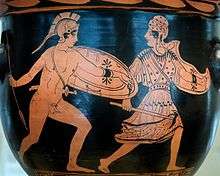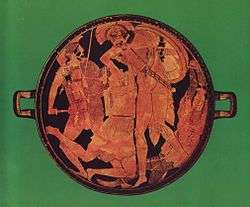Penthesilea

Penthesilea (Greek: Πενθεσίλεια) or Penthesileia was an Amazonian queen in Greek mythology, the daughter of Ares and Otrera and the sister of Hippolyta, Antiope and Melanippe. Quintus Smyrnaeus[1] explains more fully than pseudo-Apollodorus how Penthesilea came to be at Troy: Penthesilea had killed Hippolyta with a spear when they were hunting deer; this accident caused Penthesilea so much grief that she wished only to die, but, as a warrior and an Amazon, she had to do so honorably and in battle. She therefore was easily convinced to join in the Trojan War, fighting on the side of Troy's defenders.
Penthesilea in Quintus Smyrnaeus' Posthomerica
Penthesilea arrives in Troy at the start of Posthomerica, the night before the fighting is due to recommence following Hector's death and funeral. She came to Troy to prove to others that her people, the Amazons, are great warriors and can share the hardships of war and to appease the gods for accidentally killing her sister Hippolyta while hunting. She arrived with twelve companions and promised the Trojans that she would kill Achilles. On her first and only day of fighting, Penthesilea kills many men and clashes with Telamonian Ajax, although there is no clear victor, before she comes face to face with Achilles, who had been summoned by Telamonian Ajax. Prior to Achilles' entrance, Penthesilea had tried to fight Telamonian Ajax but he had merely laughed off her attempts, thinking her an unfit opponent. With only one blow Achilles pierces her breastplate then proceeds to impale both her and her horse. At first he mocks her corpse until he removes her helmet and feels strong remorse.[2]
Penthesilea in the Epic Cycle
Proclus, who summarized the lost epic poem, the Aethiopis of Arctinos of Miletus, of which only five lines survive in a quotation,[3] gave the events of Penthesilea's life. The story of Penthesilea segues so smoothly from the Iliad in the Epic Cycle that one manuscript tradition of the Iliad ends
- "Such were the funeral games of Hector. And now there came an Amazon, the great-hearted daughter of man-slaying Ares."
According to Diodorus Siculus
- "Now they say that Penthesileia was the last of the Amazons to win distinction for bravery and that for the future the race diminished more and more and then lost all its strength; consequently in later times, whenever any writers recount their prowess, men consider the ancient stories about the Amazons to be fictitious tales." (Diodorus Siculus, ii. 46).
Alongside Penthesilea were twelve other Amazons, including Antibrote, Ainia, and Clete. The rest were Alcibie, Antandre, Bremusa, Derimacheia, Derinoe, Harmothoe, Hippothoe, Polemusa, and Thermodosa.[4]
Death of Penthesilea

In the Pseudo-Apollodorus Epitome of the Bibliotheke[5] she is said to have been killed by Achilles, "who fell in love with the Amazon after her death and slew Thersites for jeering at him". This is commonly interpreted to mean that Achilles was enamored of Penthesilea,[6] a view that appears to be supported by Pausanias, who noted that the throne of Zeus at Olympia bore Panaenus' painted image of the dying Penthesilea being supported by Achilles.[7]
The Greek Thersites jeered at Achilles's treatment of Penthesilea's body, whereupon Achilles killed him. "When the roughneck was at last killed by Achilles, for mocking the hero's lament over the death of the Amazon queen Penthesilea, a sacred feud was fought for Thersites' sake".[8] Thersites' cousin Diomedes, enraged at Achilles' action, harnessed Penthesilea's corpse behind his chariot, dragged it and cast it into the Scamander. Either Achilles or the Trojans—the fragmentary sources are unclear—retrieved the body and gave it a decent burial.[9]
Robert Graves on Penthesilea
In Robert Graves' short poem "Penthesileia", Achilles "for love of that fierce white naked corpse / Necrophily on her" commits,[10] then slays Thersites for his mockery of Achilles' behavior.
A different tradition, attested in a lost poem of Stesichorus[11] makes Penthesilea the slayer of Hector, who in turn is seen as a son of Apollo.
Theme of Penthesilea
The subject of Penthesilea was treated so regularly by a fifth-century BC Attic vase-painter, whose work bridged the "Severe style" and Classicism, that Adolf Furtwängler dubbed him "The 'Penthesilea Painter". A considerable corpus for this innovative and prolific painter, who must have had a workshop of his own, was rapidly assembled[12] in part by J.D. Beazley.
Heinrich von Kleist's Penthesilea
The treatment of Penthesilea that has received most critical attention since the early twentieth century is the drama Penthesilea by Heinrich von Kleist, who cast its "precipitously violent tempo"[13] in the form of twenty-four consecutive scenes without formal breaks into acts. The Swiss composer Othmar Schoeck wrote a 90' one-act opera, Penthesilea (Dresden, 1927) based on Kleist's drama. The French composer Pascal Dusapin's opera based on Kleist's work is scheduled to premiere in 2015 at La Monnaie in Brussels under the baton of Ludovic Morlot.[14]
Popular culture

- The asteroid 271 Penthesilea, discovered in 1887, was named in her honor.[15]
- In Shakespeare's comedy Twelfth Night, Sir Toby Belch affectionately refers to Maria as Penthesilea.
- The story of Penthesilea, in Kleist's reinterpretation, is referred to in Episode 5 of the 1960s German SF TV series "Raumpatrouille – Die phantastischen Abenteuer des Raumschiffes Orion". This episode figures a planet governed entirely by women.
- Penthiselea (a variant spelling of Penthesilea) is the name of a character in the BBC radio series ElvenQuest, a comic fantasy which aired in 2009. Penthiselea is a warrior princess, and a member of a band of adventurers sworn to put an end to the reign of the evil Lord Darkness. The character of Penthiselea was played by Sophie Winkleman and Ingrid Oliver.[16]
- In the Japanese role-playing game Persona 3, Penthesilea is the original Persona of Mitsuru Kirijo.
- Penthesilea is a playable character of the Trojan side in the video game Warriors: Legends of Troy.
- In his novel Looking Backward 2000-1887 Edward Bellamy describes his hero Julian West, relocated from the Boston of 1887 to the transformed city of 2000, reading a book by an author named Berrian, entitled Penthesilia.
- Penthesilea, though a fairly minor character in the story, is central to one of the plots of Dan Simmons' novel Olympos where her death by the hands of Achilles prompts the hero to begin a journey in search of the then-lost Zeus.
- In the Marilyn French novel The Women's Room, the character Val, an ardent and outspoken feminist, is briefly compared to Penthesilea.
- In the novel Shards of Honor by Lois McMaster Bujold, Count Vortala asks Aral Vorkosigan whether Captain Cordelia Naismith is his "Betan Penthesileia".
- Penthesilea is the 7th opera by French composer Pascal Dusapin, it premiered at La Monnaie on March 31, 2015.
- In the novel " The Firebrand" by Marion Zimmer Bradley (October 1, 1987 by Simon & Schuster) Kassandra, daughter of Priam and Hecuba, princess of Troy and Paris' twin is sent to live with her aunt Penthesilea, chief of the Amazons.
Notes
- ↑ Quintus Smyrnaeus, Posthomericai.18ff.
- ↑ "Priestesses" by Norma Lorre Goodrich Quintus, and Alan James. "Book I." The Trojan Epic: Posthomerica. Baltimore: Johns Hopkins UP, 2004. 1-20. Print.
- ↑ Quintus Smyrnaeus on-line text.
- ↑ Julie Ruffell, "Brave women warriors of Greek myth: an Amazon roster" gives a long alphabetized list of Amazon names, but with no citations.
- ↑ Pseudo-Apollodorus Epitome of the Bibliotheke 5.1 (Sir James George Frazer's translation).
- ↑ Sextus Propertius, in Book III.11, poem XI, of his Elegies
- ↑ "And, at the extremity of the painting, is Penthesilea breathing her last, and Achilles supporting her" (Pausanias, 10.31.1 and 5.11.2, noted by Graves 1960) This was the action that aroused Thersites' scorn.
- ↑ Abraham Feldman, "The Apotheosis of Thersites" The Classical Journal 42.4 (January 1947, pp. 219-220) p 220.
- ↑ Graves 1960:section 164.
- ↑ Robert Graves. "Penthesileia". Collected in Selected Poems. Faber & Faber, 2013. ISBN 0571283845. (Google Books)
- ↑ Quoted by John Tzetzes, On Lycophron, 266, noted by Graves 1960, section 163q, note 21.
- ↑ Mary Hamilton Swindler, "The Penthesilea Master" American Journal of Archaeology 19.4 (October 1915), pp. 398-417. In the series Bilder Griechischen Vasen volume 10, edited by Hans Diepolder (1936) is devoted to the Penthesilea-Maler.
- ↑ John C. Blankenagel, The Dramas of Heinrich von Kleist: A Biographical and Critical Study (Chapel Hill: University of North Carolina Press) 1931, p 145.
- ↑ Thomas May, "Stairway to Heaven: A Major Seattle Symphony Premiere," November 15, 2013, accessed November 15, 2013
- ↑ Schmadel, Lutz D.; International Astronomical Union (2003). Dictionary of minor planet names. Berlin; New York: Springer-Verlag. p. 39. ISBN 978-3-540-00238-3. Retrieved 9 September 2011.
- ↑ "The audio recording of ElvenQuest, published by BBC Audio in August 2009, ISBN 9781408439241"
References
| Wikimedia Commons has media related to Penthesilea. |
- Justinus, Epitome Historiarum philippicarum Pompei Trogi ii.4.31-32
- Epitome of the Philippic History of Pompeius Trogus Book 2
- The audio recording of ElvenQuest, published by BBC Audio in August 2009, ISBN 9781408439241
| Preceded by Hippolyta |
Queen of the Amazons | Succeeded by Antianara |

